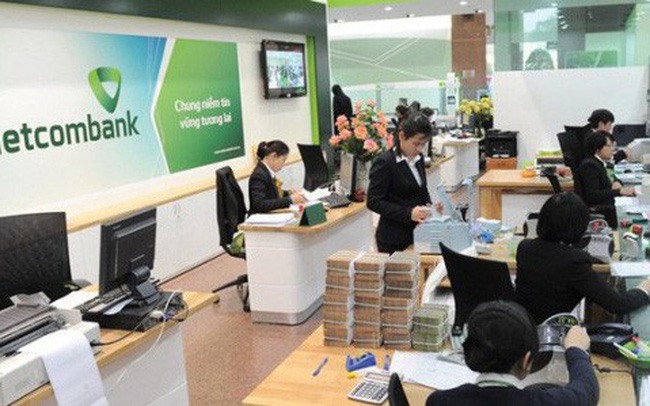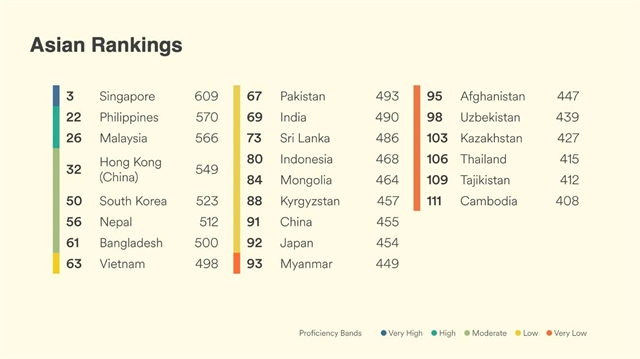 Business Beat
Business Beat

Analysts attributed the excellent performances in the banking sector this year to sharp credit growth.
 |
Compiled by Thiên Lý
Vietcombank reportedly plans to revise its profit target for this year from VNĐ13 trillion (US$572.7 million) to VNĐ14 trillion ($616.7 million).
If true, it will be the second time the country’s largest bank adjusts its target this year. At its annual general meeting in April the target had also been increased by VNĐ1 trillion to VNĐ13 trillion.
The second revision follows a sharp rise in profits – by a record 59.3 per cent — in the first quarter to VNĐ4.36 trillion ($192 million).
Though they do not have plans yet to revise their profit targets this year, many other lenders also believe their bottom lines will exceed the targets.
Asia Commercial Bank for instance reported profits of VNĐ1.49 trillion in the first quarter, a year-on-year increase of 151 per cent.
Its general director, Đỗ Minh Toàn, said the bank would make an all-out effort to resolve its non-performing loans (NPLs) and reverse the VNĐ500 billion it had provisioned for bad and doubtful debts to its profit and loss account this year.
ACB should be in a position to easily surpass the year’s profit target, he said.
An HDBank spokesperson said the lender had already revised its pre-tax profit target from VNĐ3.933 trillion to VNĐ4.712 trillion thanks to its outstanding performance in the first few months of the year. In the first quarter its profits were worth VNĐ1.05 trillion, three times the figure for the same period a year earlier.
Analysts attributed the excellent performances in the banking sector to sharp credit growth.
According to the National Financial Supervisory Commission, outstanding loans as of March-end rose by an estimated 3.5 per cent for the year.
Besides, lenders have not had to make as much risk provisioning as in previous years.
Analysts also said many banks have kept their interest rate spread, the difference between the interest rates on loans and deposits, at an ideal level resulting in such good profitability.
But they warned that banks face challenges.
According to Việt Nam Report Joint Stock Company, risks related to credit, liquidity and interest rates will remain key issues.
The high credit growth has been achieved by shifting from property developers to individual consumers, a less risky proposition.
But this means a possible increase in fraudulent information by loan applicants. Besides, banks have to compete for customers with finance companies, who are usually very nimble.
The State Bank of Việt Nam has tightened the regulations governing corporate bond purchases by credit institutions and foreign banks.
Circular 15/2018, effective from August 2 this year, prohibits them from buying bonds issued for restructuring existing loans.
The central bank also requires them to have an internal credit rating system besides a system to rate bond issuers.
They are also required to have in place internal regulations for buying corporate bonds.
But analysts are mixed in their reactions.
Some say an estimated 75 per cent of corporate bonds are bought by banks, which makes them no different from bank loans.
Many companies sell bonds to banks to restructure their existing loans rather than raise new capital, defeating the main purpose, they say.
Thus, the SBV’s tightening of bond purchase rules also prevents the possibility of banks resorting to creative accounting and buying bonds issued by a company as a straight swap with its bad debts.
But others are less happy with the new policy, warning it would limit purchase of corporate bonds, reducing enterprises’ opportunities to mobilise funds.
For many years banks have been overwhelmingly the biggest buyers of bonds.
Individual investors are not interested in corporate bonds since few can assess a company’s performance well enough and Việt Nam lacks reliable investment information and credit rating agencies.
According to the National Financial Supervision Committee, last year the sum raised by issuing corporate bonds was down 15 per cent to an estimated VNĐ100 trillion ($4.41 billion).
The Government’s road map for the development of the bond market in 2017 -20 sees outstanding corporate bonds at 7 per cent of GDP by 2020 and 20 per cent by 2030.
The figure is now a mere 1 per cent, meaning a huge effort is needed from here on.
Remittances shrug off US interest rate hikes, rise sharply
On June 13 the US Federal Reserve raised its benchmark interest rate by 0.25 percentage points and signalled that two more increases are on the way this year.
The hike was the second this year and the seventh since the end of the recession, and took the rate to a range of 1.75-2 percent.
Since last year the FED had made several hikes in interest rates, causing the US dollar to appreciate sharply against many currencies including the đồng.
But oddly, the multiple rate hikes by the US and Việt Nam’s policy of keeping the interest rate on the greenback at zero have not affected remittances from abroad.
In the first half of this year Hồ Chí Minh City, which accounts for a lion’s share of the country’s inward remittances, reported inflows of around US$2.45 billion, up nearly 20 per cent year-on-year, according to the city branch of the State Bank of Việt Nam.
Of this figure, 60 per cent came from the US and 19 per cent from Europe.
The central bank also said that 72 per cent of the remittances were invested in businesses while 22 per cent went into real estate and the remaining 6 per cent into personal expenses.
Analysts attribute the continuing rise in the remittances to several reasons, the first of which is that interest rates on đồng deposits are still attractive.
The rates for 12 month-term deposits at smaller banks stand at a rather high 7-8 per cent.
Another and more important reason is the sharp recovery by the Vietnamese real estate and stock markets, which have also attracted investments from overseas Vietnamese.
The VN Index, the benchmark stock index, gained 19.33 per cent in the first three months of this year, the best-performing market in the whole world.
It ended March 31 at 1,174.46, up a staggering 200 points since the beginning of the year.
Experts say the thriving economy and the Land Law that allows foreigners to own houses in Việt Nam without much difficulty are encouraging Vietnamese expats to send more and more money.
Besides, the Government’s strong push to equitise major State-owned enterprises, many of which have huge parcels of land in prime locations, is a key reason why foreign companies including those owned by overseas Vietnamese are keen on Việt Nam.
According to Savills Việt Nam, about 71 per cent of the remittances go into businesses each year and some 21-22 per cent, or US$2.5 billion, goes into the real estate market. VNS









